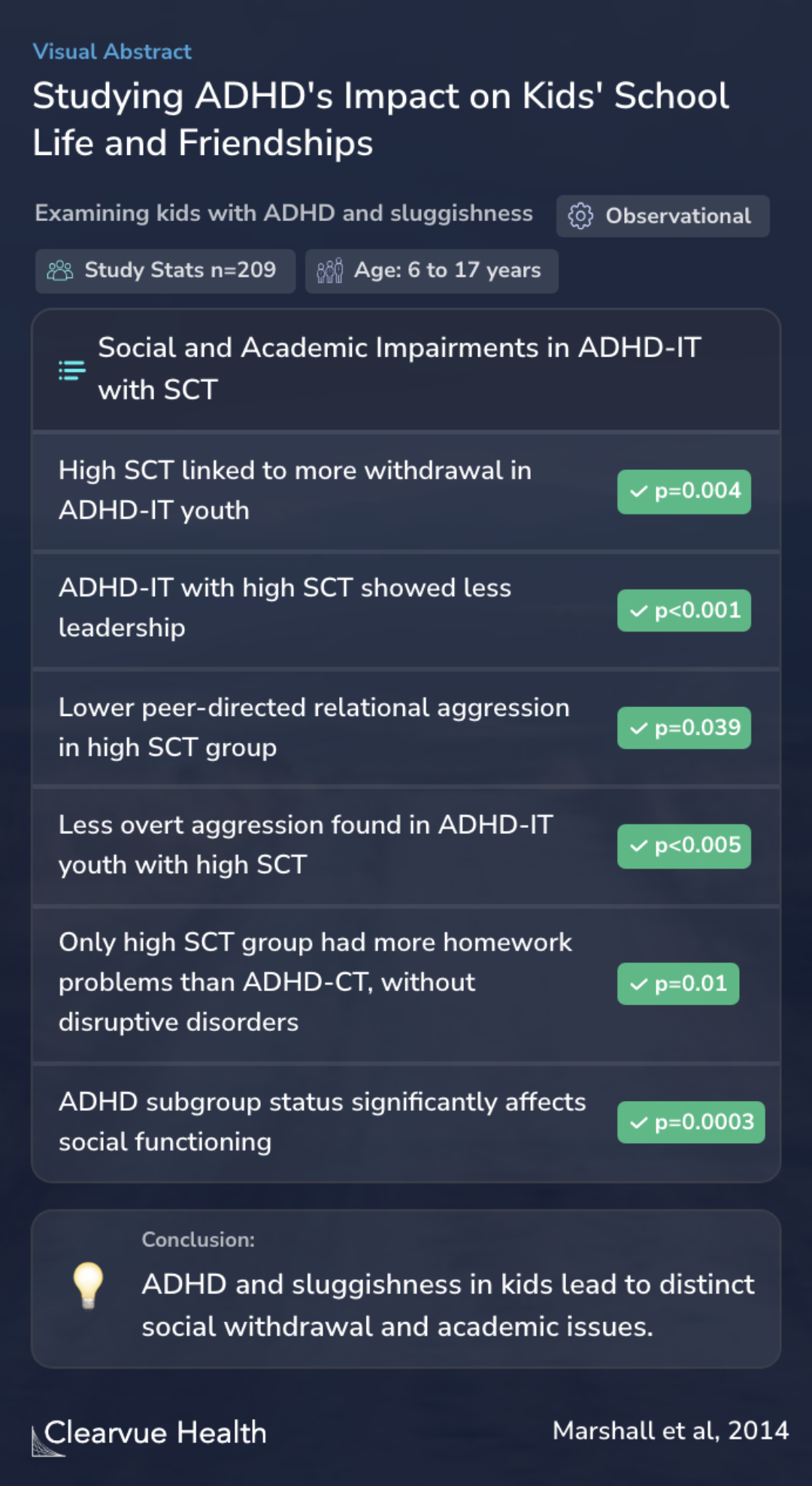Social and academic impairment in youth with ADHD, predominately inattentive type and sluggish cognitive tempo
Studying ADHD's Impact on Kids' School Life and Friendships
Marshall SA, Evans SW, Eiraldi RB, Becker SP, Power TJ

Objectives
The study aimed to explore if young people diagnosed with a certain type of Attention Deficit Hyperactivity Disorder (ADHD), known as ADHD-IT, and who also show high levels of what's called Sluggish Cognitive Tempo (SCT), face unique challenges in their social lives and schoolwork.
The objective of the current study was to investigate whether youth with clinically-assessed ADHD-IT and high levels of SCT exhibit unique social and academic impairments.
Methods
The research focused on a group of 209 young individuals, ranging from 6 to 17 years old, who were selected for the study due to their ADHD symptoms. These participants were divided into three distinct groups based on their specific ADHD characteristics and the presence of SCT symptoms. This division was crucial for understanding how these factors might influence their abilities to interact with others and perform academically.
In a clinic-referred sample of youth (N = 209; 23 % female) aged 6 to 17 years, participants who met criteria for three different groups were identified: ADHD, Combined Type (ADHD-CT; n = 80), ADHD-IT with low SCT symptoms (n = 74), and ADHD-IT with high SCT symptoms (n = 55). These grou...
Results
The findings revealed that the group with ADHD-IT and high SCT symptoms stood out, particularly in how they interact with peers. They were likelier to keep to themselves, showed less inclination to take charge in groups, and were less aggressive towards others. Interestingly, when it came to homework, this group faced more challenges than those with a different type of ADHD (ADHD-CT), but this was only the case when no other disruptive behavior disorders were present.
Youth with ADHD-IT high in SCT exhibited uniquely elevated withdrawal, as well as low leadership and low peer-directed relational and overt aggression, which were not accounted for by co-occurring disorders. This high-SCT group was also the only group to have more homework problems than ...
Conclusions
The study highlights that kids with ADHD-IT and high levels of SCT have distinct social and academic issues. These challenges are particularly evident in how they relate to others rather than their schoolwork. This finding suggests that when doctors and teachers notice these specific symptoms, they might need to consider different ways to help these kids succeed in school and with friends.
The distinctiveness of the high-SCT group, which was primarily evident in social as opposed to academic functioning, provides partial support for the external validity and clinical utility of SCT.
Key Takeaways
Context
Understanding ADHD and its various types is crucial as it affects children's behavior in diverse ways. For instance, boys with the combined type of ADHD might face more mental health challenges, like anxiety and depression, which can impact their daily lives. On the other hand, children with the inattentive type of ADHD tend to be less aggressive:
Moreover, the effectiveness of medication versus skills training for improving social skills in children with ADHD is a topic of ongoing research. Some studies suggest that medication alone might be sufficient for enhancing social skills without the need for additional social skills training. This information is vital for parents and educators in making informed decisions about the best interventions for children with ADHD.